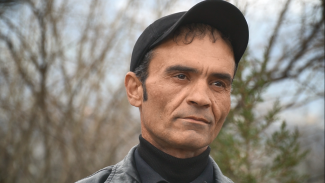“TB harms the body, but the attitude and words of people who were your friends before the illness causes a hundred times more pain to your soul,” said Umarali Nabiyev.
Fifty-year old Umarali Nabiyev knows both the physical pain and emotional trauma of TB. The stigma associated with having TB in Tajikistan can lead to adverse treatment outcomes. Due to a limited understanding of the cause and effective curative methods, friends and family can often avoid TB patients and shame them. The stigma contributes to delays in seeking treatment and treatment non-compliance. Umarali has had the disease twice.
In 2011, while working as a milling machine operator in Russia, Umarali was diagnosed with pulmonary TB and started treatment. In 2018, six months after returning to his home in southern Tajikistan’s Norak district, he learned that he had TB of the lymph nodes.
Umarali recalls how he was ostracized for his illness. “When I got sick with TB for the second time, I felt that everyone was pointing a finger at me. My friends avoided meeting me. When I arrived somewhere, people just got up and left. It seemed to me that I would never be able to rejoin life in society.”
For a long two years, Umarali struggled with lymphatic TB. Throughout his treatment, Umarali was curious, asking doctors about how and when to take his drugs, why it is important to have a healthy diet, and how best to adhere to his treatment. Umarali was determined to get better, so he stuck with his medications despite difficult side effects.
In early 2020, while still undergoing treatment, Umarali took part in an informational session led by an outreach worker from the USAID Eliminating TB in Central Asia activity and local TB specialist in Norak. As Umarali recalls, at the session, “For the first time, I felt a positive attitude toward myself. The supportive speeches and friendly approach of the outreach workers gave me and other people with TB hope for a cure. It was as if I gained strength— I changed my views and plans for the future.”
After the informational session, Umarali started to speak up against the disrespect people had shown him. He spread the word that TB is curable and not an inherited disease.
Umarali even took the unusual step of lodging a complaint—successfully—against a staff member at a regional TB hospital in Bokhtar city for his disrespectful treatment of patients. In the end, the healthcare worker’s conduct was determined to be unacceptable. The hospital’s management addressed this and provided a stern reminder to all the staff at the facility about the importance of treating patients with respect.
In May 2020, Umarali’s doctor said he was cured. Very happy for what he viewed as a win, Umarali began rebuilding his life. He was seeking a job when he heard that the USAID Eliminating TB in Central Asia activity was looking for an outreach worker. He applied for the position and was selected based on his new knowledge about TB and willingness to help people with the disease. In this role, Umarali actively contributes to the detection of new TB cases, advises people with TB on the importance of adherence to TB treatment, and provides social support to people with drug resistant TB. He has even trained one of his cured clients as a new outreach worker. Together, they work to reduce the burden of TB in the Norak district.
Both in his work and his life, Umarali pays special attention to addressing stigma and discrimination against vulnerable groups, speaking up about it on local radio, informing people about TB and the importance of lending a helping hand to the sick.
In early 2021, the USAID Eliminating TB in Central Asia activity recognized Umarali as its best outreach worker. Umarali says, “Many thanks to USAID for changing my life and beliefs. I do my best to contribute to the elimination of TB and change the attitude of people towards individuals with this disease. After all, one kind word can cheer up an ill person and bring hope for a cure. I too went through it all.”
Since June 2020, the USAID Eliminating Tuberculosis activity has screened about 37,000 persons among vulnerable and high-risk populations in Tajikistan and over 100,000 people across Central Asia, including contacts, migrants, and people living with HIV. The activity has also provided psycho-social support to 997 new and relapsed DR-TB patients in Tajikistan to support adherence to complete the treatment.

USAID ETICA Project
